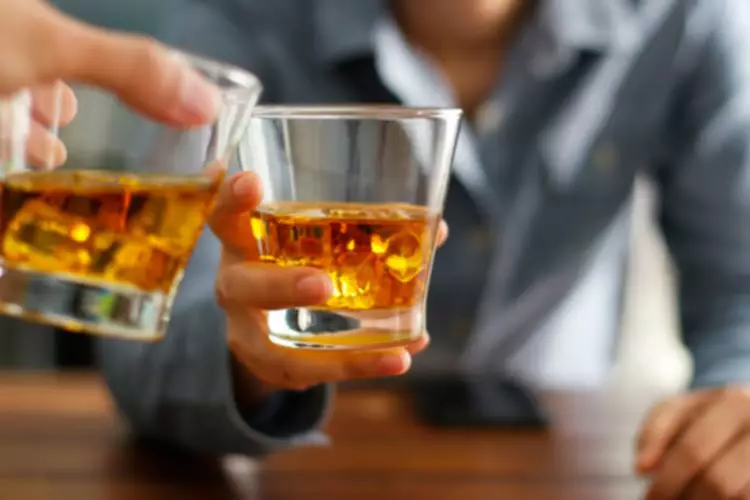
People who go to bed with alcohol in their system may be more likely to wake early in the morning and not be able to fall back to sleep, another consequence of the rebound effect. Consuming alcohol and experiencing restricted sleep reduces alertness during the day. If you’re turning to alcohol to help you sleep, you may be making the quality of your sleep worse.

Sleep Medicine Physician

That can then create an unhealthy cycle of using stimulants such as caffeine to stay awake, then self-medicating at night with alcohol to fall asleep again, according to the Sleep Foundation. According to an observational study cited by the Sleep Foundation, even low to moderate amounts of alcohol — two drinks or less for men and one drink or less for women — decreased sleep quality by nearly 10 to 24 percent. Alcohol can affect individuals differently and even affect the same person in different ways at various times, depending on factors such as how much and how quickly alcohol is consumed.
The association between alcohol consumption and sleep disorders among older people in the general population
This is why alcohol and sleep problems (such as insomnia) go hand-in-hand. In fact, in one study on older adults those who binge drank frequently were 84 percent more likely to report insomnia symptoms than those who didn’t. Since using alcohol routinely to fall asleep leads to disrupted sleep, people can experience chronic daytime sleepiness.
Alcohol and Other Health Risks
As a passionate advocate for science-based content, she loves writing captivating material that supports scientific research and education. In her spare time, you can often find her exploring nature with her husband and three children. Alcohol is classified as a central nervous system depressant, meaning it slows down brain activity. While “relaxed” may sound appealing, alcohol has also been shown to negatively affect sleep and other physiological processes that occur during sleep. So, does alcohol help you sleep or is it actually interfering with your quality of rest?
How does alcohol affect sleep?

Binge drinking or excessive alcohol consumption is likely to negatively impact sleep more than light or moderate drinking. Because alcohol’s effects vary for each person, even small amounts can worsen sleep quality for some people. It might come as a surprise, but having a few drinks before bed can increase sleep disruptions throughout the night.
How Does Alcohol Withdrawal Affect Sleep?
During alcohol withdrawal, it’s crucial to address both the physical symptoms of withdrawal and any underlying mental health conditions that may contribute to insomnia, such as anxiety or depression. Vivid dreams and https://ecosoberhouse.com/article/how-to-build-alcohol-tolerance-improve-your-alcohol-tolerance-now/ nightmares — With alcohol in your system you’re more likely to have intense, colorful dreams and nightmares as you sleep patterns ebb and flow. You may or may not remember them, but they can be lucid or give you a feeling that you are half awake and half asleep. Withdrawal symptoms are a whole different world than alcohol-induced sleep problems. Because on top of sleep disturbances, you can also experience anxiety, shakiness, headaches, brain fog, and a range of other detox symptoms. Research on alcohol and sleep shows that moderate-to-heavy drinking has a detrimental effect on sleep.
- Moderate alcohol consumption lowered restorative sleep quality by 24 percent, and high alcohol intake by as much as 39.2 percent.
- Experts state that acute insomnia lasts up to a few days to weeks, while chronic insomnia continues for several months.
- If you’ve had several drinks, it’s best if your last drink is finished at least several hours before you go to bed.
What you can do if your sleep is impacted
In other cases, it’s caused by an uncomfortable sleeping environment, substance use, or shift work. Ria Health offers several FDA-approved medications for alcohol use disorder. When combined with counseling, this approach is proven highly effective. “It’s hard to alcohol insomnia overstate the importance of sleep, in terms of both quality and quantity,” adds Prof. Myllymäki.
How Much Alcohol Does it Take To Distrupt Sleep?
Not getting enough REM sleep can make concentrating difficult, cause forgetfulness and leave people feeling excessively sleepy during the day. Poor sleep can also contribute to a wide range of health problems, according to the NIH, including obesity, high blood pressure and depression. Guy Meadows, a sleep researcher and co-founder of The Sleep School, an online platform offering science-based support around sleep, told Live Science that alcohol affects the four stages of sleep in different ways. If you fancy a glass of wine with dinner or a nightcap before bed, you might want to cap the Chiante and put the Negroni down — research shows that even low alcohol intake can stymie your sleep. If left untreated, insomnia can affect an addicted person’s recovery and contribute to relapse. Since alcohol can cause lightheadedness and sedation, people assume it can be a makeshift sleep medicine.
- It’s characterized by difficulty falling asleep, staying asleep, or both.
- For example, people who’ve had alcohol may experience more frequent periods of lighter sleep or being awake, especially during the second half of the night.
- However, there are many coping skills a person can practice to improve their sleep.
- Women’s sleep is more disturbed by alcohol than men’s, Meadows said.
- The influence of alcohol on sleep therefore needs to be evaluated by exploring both the short term effects on sleep (cross sectional data) and the long-term consequences (longitudinal data of repeated measures).
- For example, you might feel overstimulated, restless, and anxious after quitting.
- REM sleep, which gets shortchanged in the first half of the night under the influence of alcohol, is important for mental restoration, including memory and emotional processing.
More Vivid Dreams
And regularly using alcohol to fall asleep can lead to serious health consequences. Our finding that those who have trouble falling asleep were more likely to be persistent heavy drinking suggests that they may be using alcohol as a sedative. This is partially corroborated in an earlier study on same population. The Whitehall II participants were asked about reasons for change in drinking over the last 10 years and an increase in consumption was cited as a means to help get to sleep was by 6% of men and 5% of women21.
Ways Alcohol Disrupts Your Night
This can seem like a good thing at first, but it doesn’t paint the whole picture of what happens to your body throughout the night. There are few other longitudinal population based studies with which to compare our findings. Among 1,920 community dwelling men and women, those with persistent alcohol dependence had higher odds of insomnia that those without alcohol dependence over a fifteen year follow-up20. Whilst we did not measure alcohol dependence, we did find such an association between hazardous drinking and disturbed sleep in our data. Small amounts of alcohol may cause short-term sleep disturbances, but frequent and large quantities of alcohol consumption may lead to chronic insomnia for certain individuals. While drinking alcohol before bedtime may help you feel relaxed and sleepy, enjoying a nightcap puts you at risk of experiencing repeated wakings and low-quality sleep later in the night.
